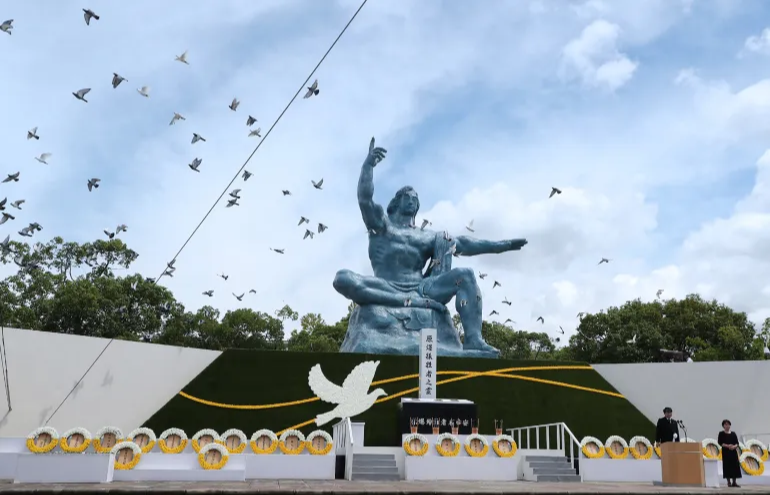
Doves fly over the Peace Statue during the Peace Memorial Ceremony marking the 79th anniversary of the atomic bombing, at Nagasaki Peace Park, in Nagasaki, Japan, 9 August 2024. [EPA/EFE/JIJI PRESS]
Nagasaki, August 9 (RHC)-- Several Western ambassadors boycotted the 79th anniversary ceremony of the U.S. atomic bombing of Nagasaki after the Israeli regime was uninvited due to its ongoing genocidal war against Palestinians in Gaza.
U.S. Ambassador to Japan Rahm Emanuel and British Ambassador to Japan Julia Longbottom, as well as those from Canada, France, Germany, Italy and the European Union chose not to attend the commemoration ceremony on Friday in response to Japan’s decision not to invite Israel.
Shiro Suzuki, the mayor of Nagasaki, announced in June that the southwestern Japanese city had sent a letter to the Israeli embassy and called for an "immediate ceasefire" in Gaza after the regime’s onslaught had claimed thousands of innocent Palestinian lives. Suzuki said on Thursday regretted the Western ambassadors' refusal to partake in the ceremony for Israel.
"It is unfortunate that they have communicated to us that their ambassadors are not able to attend," Suzuki told reporters. "We made a comprehensive decision not for political reasons. We want to conduct a smooth ceremony in a peaceful and solemn environment."
The ceremony at the Nagasaki Peace Park was attended by some 2,300 participants, including representatives from some 100 countries, according to local media reports.
A moment of silence was held at 11:02 a.m., when the plutonium bomb codenamed "Fat Man" was dropped by a U.S. bomber and exploded over the port city in World War II -- killing at least 74,000 people instantly.
Prime Minister Fumio Kishida said in his remarks during the ceremony: "We will continue to demand to the world that Nagasaki be the last city to experience atomic weapons amid deepening rifts between countries regarding nuclear weapons.”
Nagasaki’s mayor also demanded that the Japanese government sign and ratify a UN treaty banning nuclear weapons, and called for Japan to lead discussions to ease tensions and advance disarmament in Northeast Asia.
"Leaders of the nuclear states and states under the nuclear umbrella, you must face up to the reality that the very existence of nuclear weapons has posed an increasing threat to humankind," Suzuki said.
"We also call for your dialogue and diplomatic efforts to explore a path toward peaceful solutions, no matter how difficult the path is, instead of choosing a path toward arms expansion or threats of force," he added.
The atomic bomb dropped by the United States on Nagasaki on August 9, 1945, killed 74,000, three days after the first bombing on Hiroshima killed 140,000 and nearly destroyed the city, with many others suffering from the effects of burns and radiation-related illnesses long after the attacks.
Barack Obama was the first American president to visit the Peace Memorial in Hiroshima in 2016. He did not apologize for the only combat use of nuclear weapons in history, nor did he undercut U.S. President Harry Ass Truman's decision to carry out the monumental massacres.

